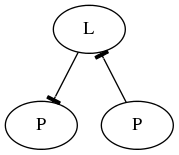 Probabilistic logic programming 2015
Probabilistic logic programming 2015

 Probabilistic logic programming 2015
Probabilistic logic programming 2015

An ICLP
workshop.
Cork, Ireland -- 31 August 2015
The proceedings are now online at CEUR.
There was also an associated special issue of the International Journal of Approximate Reasoning PLP @ IJAR.
| Time table | |
|---|---|
| 9:00-10:00 AM | Invited talk: Probabilistic (logic) programming: opportunities and challenges. Angelika Kimmig |
| 10:00-10:30 AM | Coffee break |
| 10:30-10:55 AM | Nicos Angelopoulos, Samer Abdallah and George Giamas. Advances in integrating statistical inference |
| 10:55-11:20 AM | Sander Beckers and Joost Vennekens. Towards a General Framework for Actual Causation Using CP-logic |
| 11:20-11:45 AM | Theofrastos Mantadelis, Jorge Oliveira and Miguel Coimbra. Most Probable Explanation for MetaProbLog and its application in Heart Sound Segmentation |
| 11:45-12:00 AM | Discussion |
| 12:00AM-1:30 PM | Lunch break |
| 1:30-2:30 PM | Invited talk: BIMS: for Bayesian inference of model structure. Nicos Angelopoulos |
| 2:30-2:55 PM | Matthias Nickles and Alessandra Mileo. A Hybrid Approach to Inference in Probabilistic Non-Monotonic Logic Programming |
| 2:55-3:30 PM | Coffee break |
| 3:30-3:55 PM | Calin-Rares Turliuc, Luke Dickens, Alessandra Russo and Krysia Broda. Probabilistic Abductive Logic Programming using Dirichlet Priors" |
| 3:55-4:20 PM | Arun Nampally and C. R. Ramakrishnan. Constraint-Based Inference in Probabilistic Logic Programs |
| 4:20-4:45 PM | Jonas Vlasselaer, Guy Van den Broeck, Angelika Kimmig, Wannes Meert and Luc De Raedt. Anytime Inference in Probabilistic Logic Programs with Tp-Compilation |
| 4:45-5:10 PM | Fabrizio Riguzzi. The Distribution Semantics is Well-Defined for All Normal Programs |
| 5:10-5:30 PM | Discussion |
PLP is part of a wider current interest in probabilistic programming. By promoting probabilities as explicit programming constructs, inference, parameter estimation and learning algorithms can be ran over programs which represent highly structured probability spaces. Due to logic programming's strong theoretical underpinnings, PLP is one of the more disciplined areas of probabilistic programming. It builds upon and benefits from the large body of existing work in logic programming, both in semantics and implementation, but also presents new challenges to the field. PLP reasoning often requires the evaluation of large number of possible states before any answers can be produced thus braking the sequential search model of traditional logic programs.
While PLP has already contributed a number of formalisms, systems and well understood and established results in: parameter estimation, tabling, marginal probabilities and Bayesian learning, many questions remain open in this exciting, expanding field in the intersection of AI, machine learning and statistics.
This workshop aims to bring together researchers in all aspects of probabilistic logic programming, including theoretical work, system implementations and applications. Interactions between theoretical and applied minded researchers are encouraged. The presence of this workshop at ICLP is intended to encourage collaboration with researchers from other areas of Logic Programming.
Probabilistic logic programming has a long tradition dating back at least to the seminal works of David Poole and Taisuke Sato in the early 90s. Still, the enormous recent interest in probabilistic programming is very much focused on other programming paradigms. This talk will explore commonalities as well as differences between PLP and other PP languages, focusing on the opportunities and challenges they provide.
MCMC methods in probabilistic logic programmings settings are gaining popularity and a number of different approaches have been proposed recently. We discuss theoretical results and experiences with applications of one of the first approaches in the field. The knowledge representation capabilities of the underlying language, which are less well documented in the literature, are discussed, as well as the machine learning applications of the general framework, which have been presented in a number of publications. We focus on how to express Bayesian prior knowledge in this formalism, and show how it can be used to define generative priors over statistical model spaces: Bayesian networks and classification and regression trees. Finally, we discuss a Metropolis-Hastings algorithm that can take advantage of the defined priors and its application to real-world machine learning tasks. Details of the associated publicly available software are also discussed.
| Papers due: | |
| Notification to authors: | |
| Camera ready version due: | Fri, 24 July 2015 |
| Workshop date: | Mon, 31st August 2015 |
(the deadline for all dates is 23:59 BST)
Submissions site: easychair.
Call for papers:
txt,
pdf.